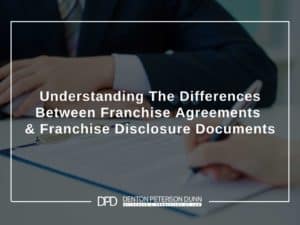
Unfortunately, some franchisees do not fully understand their franchise agreements when they sign and might discover later that their legally binding deal is not quite what they were expecting. Although franchise agreements are long and complex, it’s absolutely critical to read and understand them completely. When you consider joining a franchise, you will also be given a franchise disclosure document. If you are not trained in the law, you may find this document to be confusing and decide to scan it quickly, or just trust the assurances of the franchisor’s sales staff and skip the contract review. That can be a ruinous mistake.
As a franchisee, it’s important to work with your Arizona franchise lawyer to understand the difference between the Franchise Disclosure Document (FDD) and the franchise agreement, so that you know exactly what you are agreeing to.
Simply stated, a franchise agreement is a legal document that binds the franchisor and franchisee. The agreement will explain what is expected of the franchisee in running the business, and what is required of the franchisor in the relationship. Although expectations are generally uniform, agreements with new franchises may be slightly different from those with existing franchises.
While the franchise agreement is signed by both parties, the FDD will be presented to the potential franchisee prior to the final agreement in order to provide information that franchisees can review before they make their final decision about whether to become a franchisee with the organization.
This document will comprehensively explain the company’s background and history, disclose any lawsuits or bankruptcies, present financial data about the organization, and lay out what the franchisee can expect from the deal.
Every franchise agreement will be different from another, but they all contain the same general components:
Contract explanation: An outline of the expected franchise relationship.
Operations manual: Details of the guidelines that the franchisee must follow. These must be kept confidential and will be occasionally amended by the parent company.
Proprietary statements: Guidelines regarding how the franchise name can be used, established marketing and advertising procedures, and financial contributions that the franchisee must make toward national advertising campaigns.
Ongoing site maintenance: This refers to the types and timeframes of maintenance and upgrades that will be made to the franchisee’s location.
Carefully review the franchise agreement with your Chandler franchise lawyer and ask yourself plenty of questions to be sure you understand the agreement. Ask yourself:
Don’t rely on your franchise broker for legal advice. Although they may be nice people with a lot of legal knowledge, they get paid when the deal closes, so closing the deal is going to be their main focus. They only get paid when you sign the deal, which is too big of a conflict of interest for you to ignore. Make sure you work with an experienced attorney who fully understands your state’s laws regarding franchises. Since franchise law is an area of specialty, you want a Goodyear business attorney who has experience and expertise in the field. A trusted attorney will help you understand all of the terms of the franchise agreement, which issues may be negotiable, or what risks you may be taking by signing the agreement. Your lawyer can also review the operation manuals if you like, to make sure they are well written.
It’s imperative to avoid signing a franchise agreement that you do not understand, especially if you are unclear on the defaults, terminations, and financial obligations once your relationship ends. All franchise relationships will eventually come to an end, so it’s crucial to be especially aware of what happens to the equity you’ve built into your franchise business.
Find out whether you’ll be able to keep the equity you’ve built if you sell before the end of your franchise term, how frequently you’ll need to remodel your business location, who will pay for the remodeling if you don’t have enough time on the agreement to amortize the investment, and what terms are required if you choose to renew the contract. Remember that your Scottsdale franchise lawyer is on your side to help you understand potential scenarios and all of the terms in your franchise agreement and disclosure documents.
Investing in a franchise is a big decision. Before you sign any agreements, consult with the attorneys at Denton Peterson Dunn. With our specialty in franchise law, we hold a comprehensive understanding of Arizona business law and have decades of experience working with franchise contracts and disputes. Let us provide the guidance you need for a successful franchise business! Contact our office today to talk with one of our trusted attorneys.
Brad Denton – Denton Peterson Dunn
1930 N Arboleda #200
Mesa, AZ 85213
Office: 480-660-3249
Email: brad@dentonpeterson.com
Website: https://arizonabusinesslawyeraz.com
7272 E Indian School Rd #540-132
Scottsdale, AZ 85251
Phone: 480-690-3283
Email: service@dentonpeterson.com
Are you dealing with labor law violations regarding trade secrets? Consult with employment law experts…
Wondering how to protect trade secrets in litigation? Learn strategies for early identification, specificity, and…
Want to protect your business from liability and disputes? Learn effective contractual tools and legal…
Concerned about embezzlement in your business? Learn how to safeguard against theft, understand legal distinctions,…
How is remote work reshaping commercial real estate? Explore how businesses are adapting leasing strategies,…
Is your business ready for remote work? Learn the legal considerations & best practices for…